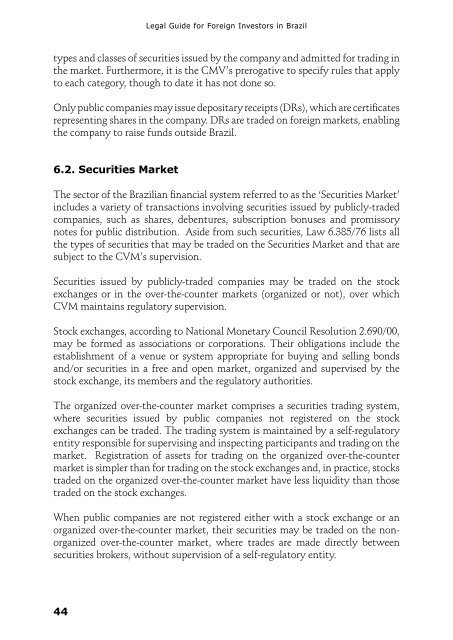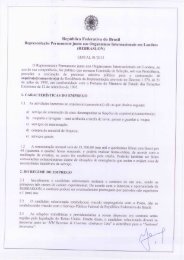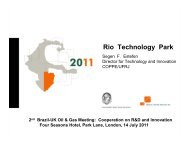Legal Guide for Foreign Investors in Brazil - Apex-Brasil
Legal Guide for Foreign Investors in Brazil - Apex-Brasil
Legal Guide for Foreign Investors in Brazil - Apex-Brasil
Create successful ePaper yourself
Turn your PDF publications into a flip-book with our unique Google optimized e-Paper software.
<strong>Legal</strong> <strong>Guide</strong> <strong>for</strong> <strong>Foreign</strong> <strong>Investors</strong> <strong>in</strong> <strong>Brazil</strong><br />
types and classes of securities issued by the company and admitted <strong>for</strong> trad<strong>in</strong>g <strong>in</strong><br />
the market. Furthermore, it is the CMV’s prerogative to specify rules that apply<br />
to each category, though to date it has not done so.<br />
Only public companies may issue depositary receipts (DRs), which are certificates<br />
represent<strong>in</strong>g shares <strong>in</strong> the company. DRs are traded on <strong>for</strong>eign markets, enabl<strong>in</strong>g<br />
the company to raise funds outside <strong>Brazil</strong>.<br />
6.2. Securities Market<br />
The sector of the <strong>Brazil</strong>ian f<strong>in</strong>ancial system referred to as the ‘Securities Market’<br />
<strong>in</strong>cludes a variety of transactions <strong>in</strong>volv<strong>in</strong>g securities issued by publicly-traded<br />
companies, such as shares, debentures, subscription bonuses and promissory<br />
notes <strong>for</strong> public distribution. Aside from such securities, Law 6.385/76 lists all<br />
the types of securities that may be traded on the Securities Market and that are<br />
subject to the CVM’s supervision.<br />
Securities issued by publicly-traded companies may be traded on the stock<br />
exchanges or <strong>in</strong> the over-the-counter markets (organized or not), over which<br />
CVM ma<strong>in</strong>ta<strong>in</strong>s regulatory supervision.<br />
Stock exchanges, accord<strong>in</strong>g to National Monetary Council Resolution 2.690/00,<br />
may be <strong>for</strong>med as associations or corporations. Their obligations <strong>in</strong>clude the<br />
establishment of a venue or system appropriate <strong>for</strong> buy<strong>in</strong>g and sell<strong>in</strong>g bonds<br />
and/or securities <strong>in</strong> a free and open market, organized and supervised by the<br />
stock exchange, its members and the regulatory authorities.<br />
The organized over-the-counter market comprises a securities trad<strong>in</strong>g system,<br />
where securities issued by public companies not registered on the stock<br />
exchanges can be traded. The trad<strong>in</strong>g system is ma<strong>in</strong>ta<strong>in</strong>ed by a self-regulatory<br />
entity responsible <strong>for</strong> supervis<strong>in</strong>g and <strong>in</strong>spect<strong>in</strong>g participants and trad<strong>in</strong>g on the<br />
market. Registration of assets <strong>for</strong> trad<strong>in</strong>g on the organized over-the-counter<br />
market is simpler than <strong>for</strong> trad<strong>in</strong>g on the stock exchanges and, <strong>in</strong> practice, stocks<br />
traded on the organized over-the-counter market have less liquidity than those<br />
traded on the stock exchanges.<br />
When public companies are not registered either with a stock exchange or an<br />
organized over-the-counter market, their securities may be traded on the nonorganized<br />
over-the-counter market, where trades are made directly between<br />
securities brokers, without supervision of a self-regulatory entity.<br />
44









